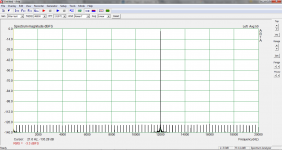Sorry, I don't consider you to have the basic knowledge to discuss timing architecture in digital audio systems.
Where's your explanation about how the signal travels on a USB cable?

It is (almost) irrelevant for the topic.
It isn't: when you know nothing about the subject at hand, shut up instead of writing nonsense.
Keep your luck for yourself, you're going to need a lot of it.
It is (almost) irrelevant for the topic.
//
Analyse the (almost) relevant part of the topic...
An externally hosted image should be here but it was not working when we last tested it.
Where's your explanation about how the signal travels on a USB cable?
Passing over that you have called me a troll, which is unnecessarily offensive and insulting. It is also not true.
Signals are transmitted over a USB cable as differential digital signals. It happens in billions of setups all over the world. Every second. Error free.
Focusing on "how the signal travels" usually indicates a very distorted understanding of signal propagation with shades of magic and woo brought in.
I note in another thread that you "do not tolerate naysayers". Further discussion is therefore a waste of time.
Edit added:
Yes, I have been looking at you and your other posts before commenting further. This is what you should do before denigrating people like SY and DF96.
You are making yourself look incredibly immature and stupid.
Last edited:
Signals are transmitted over a USB cable as differential digital signals. It happens in billions of setups all over the world. Every second. Error free.
You mean you still don't know that the differential signals are analogue voltage levels on the cable, with ramp up and ramped down times?
You are making yourself look incredibly immature and stupid.
The only ones looking dumb here are those resorting to insults when they are obviously ignorant of these facts:
1. the USB signal is made of voltage levels with ramp up and ramp down times, i.e. these are analogue signals on the cable.
2. The protocol used while doing an normal file transfer isn't the same mechanism at all than when we use Async USB which is a real-time streaming one with no re-send

I am not holding my breath for you to understand...
And when we did all of our J-test comparisons a few months ago, the USB devices should have shown miserably. Unfortunately for the story tellers, they functioned just fine.
'function just fine'.
Everything functions just fine, SY, nothing to see here
In case you thought I was dissing you: not the case - we do need the transmission of the signal to be made with the highest integrity possible, but when the SI is lacking, then the USB PHY will work more to process the recovery of the bits - this can cause noise for the DAC chip affecting SQ.
And all this is not even mentioning the noise on the power plane and ground plane when the noisy computer is connected directly to the DAC.
Now, if you have a 'perfectly isolated' DAC, count yourself lucky...
Last edited:
OK, you win with your superior intellect.
Have fun.
Just with the facts.
'function just fine'.
Yes, several of us presented data. That's not useful for stories, but it is quite useful for determining facts.
Attachments
Last edited:
And when we did all of our J-test comparisons a few months ago, the USB devices should have shown miserably. Unfortunately for the story tellers, they functioned just fine. That will not stop the stories, alas- data and evidence are not to be considered.
Where can I see the J-test?
- Status
- This old topic is closed. If you want to reopen this topic, contact a moderator using the "Report Post" button.
- Home
- Source & Line
- Digital Line Level
- Is jitter an issue with usb signals ?
